
The author of the article
Boris Lipovetskiy, DMD, 31 years experience
In this article, we will examine the pros and cons of dental implants from different perspectives. We will discuss when dental implant surgery is necessary, how safe this procedure is, and what patients have to say about dental implants. By the end of the article, you will have a comprehensive understanding of dental implants and whether they are suitable for you.
Content:
An Overview Of Dental Implants
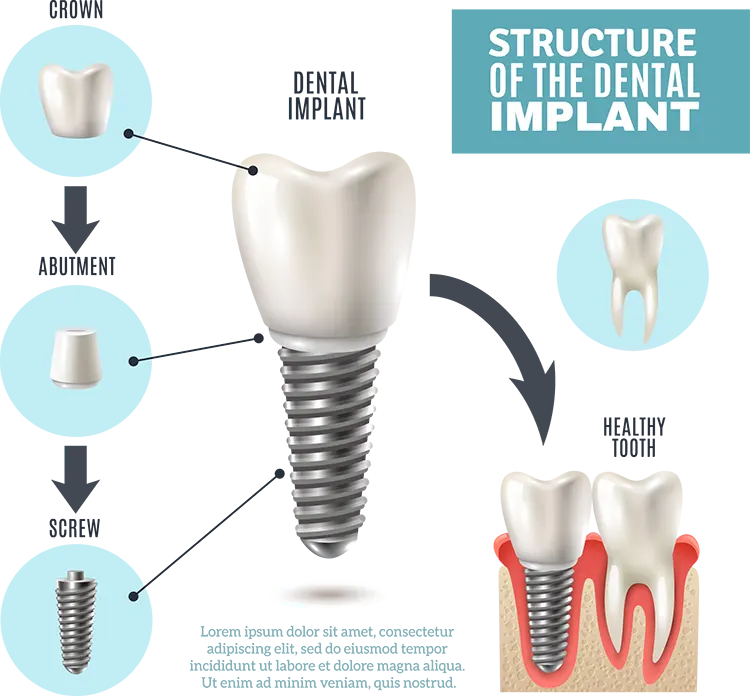
A dental implant is a titanium or zirconium post that is placed into the jawbone to replace the root of a missing tooth. It provides a strong foundation for a crown, bridge, or full denture.
-
Missing one or more teeth
-
Loss of all teeth
-
Inability to use removable dentures
-
Indications for tooth extraction
The teeth in a day protocol allows for the restoration of a smile in 1-2 visits. The dentist places the implant and immediately loads it with an adaptive prosthesis for the healing period. This temporary prosthesis fully replaces natural teeth. After the implant has integrated (in 3-6 months), the dentist replaces the temporary prosthesis with a permanent one.
| Differences | Dental Implants | Removable Dentures |
|---|---|---|
| Lifespan | 15-30 years | 4-5 years |
| Installation | Requires surgical operation | Non-invasive |
| Comfort | After osseointegration, they feel like real teeth | May cause gum irritation, pain, and discomfort during use |
| Chewing Function | Stable, help chew food well | Mobile in the mouth, making chewing difficult |
| Effectiveness | Preserve bone tissue and support facial structure | Lead to loss of jawbone, change in facial shape |
| Application | Replacement of one, several, or all teeth | Replacement of all teeth on one or both jaws |
Dental implants are a more stable solution compared to removable dentures. However, they are more expensive, require surgical procedures, and need proper aftercare.
Removable dentures are cheaper but can cause discomfort and adaptation issues. They also do not provide the necessary chewing load on the jaw.
Aesthetic and Functional Advantages of Dental Implants
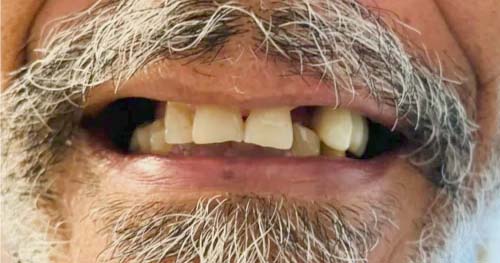
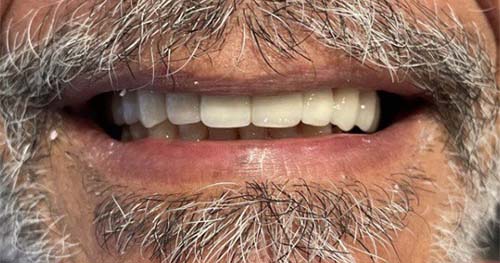
-
Implants Slow Down Bone Loss and Help Preserve Facial Structure
The loss of teeth leads to jawbone atrophy due to the lack of load previously provided by the roots. This results in changes in facial shape, the appearance of wrinkles, and other signs of premature aging.
The advantage of implants is that they help preserve the jawbone structure, maintain facial youth, and prevent further bone loss. In the case of dental bridges, the bone tissue begins to atrophy due to the lack of necessary chewing load.
-
Adjacent Healthy Teeth Remain Intact
Placing implants helps maintain the health and structure of adjacent teeth. With dental bridges, it is necessary to grind down neighboring teeth to create support.
An experienced doctor considers the patient's anatomical features and determines the placement and angle of the implant to achieve the best aesthetic result.
After the implants have integrated, doctors attach artificial dental crowns to them. These crowns mimic the shape, color, and texture of natural teeth to achieve the most natural look possible.
Schedule a consultation, and the implant surgeons at ADW center will create an individualized treatment plan for you.
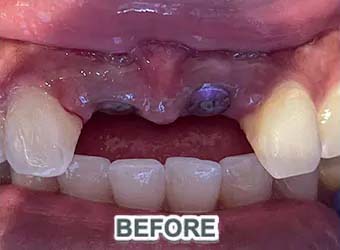
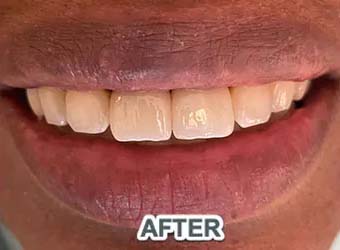
This patient needed to have two front teeth removed. The doctor carefully extracted the incisors using a minimally invasive approach and immediately placed ACE zirconium implants in their place, loading them with temporary crowns.
The implants demonstrated good osseointegration. After 5 months, the doctor placed permanent crowns made of zirconium dioxide, which provide an aesthetic appearance.
How Dental Implants Improve Health
Tooth loss makes it difficult to chew food, which can lead to stomach and intestinal problems. Dental implants restore chewing function, helping you to eat a balanced diet.
Thanks to the full chewing load, artificial roots stimulate the growth and regeneration of jawbone.
Losing one or more teeth can cause neighboring teeth to shift, which can ruin your bite. Implant systems restore the original bite and support surrounding teeth.
Teeth help in forming sounds when speaking. Their absence makes articulation difficult, leading to speech problems. The advantage of dental implants is that they help restore the structures of the oral cavity, ensuring clearer and more understandable speech.
Are Dental Implants Difficult to Care For?
No. Caring for implants is similar to caring for natural teeth. Here are some tips for maintaining implants:
- Brush Your Teeth Twice a Day: Use a soft toothbrush, non-abrasive toothpaste, and dental floss. Additionally, use ultrasonic or water irrigators. This helps prevent gum disease.
- Regularly Visit the Dentist: Schedule check-ups every 6 months. This allows for early detection of complications and prevents their development.
- Maintain a Healthy Lifestyle: Eat a balanced diet and quit smoking. This helps support the health of your gums and bone tissue, ensuring the longevity of your implants.
Durability and Stability of Dental Implants
Titanium implants last 25 years or more, as shown in the study Retrospective cohort study of rough-surface titanium implants with at least 25 years’ function. They have an excellent integration rate of 98.8%.
Zirconium systems last 10-15 years. According to the study A prospective clinical study to evaluate the performance of zirconium dioxide dental implants in single-tooth edentulous area, zirconium implants have a good integration rate, though slightly lower at 97.5%.
Zirconium Implants are More Aesthetic than Titanium. They do not show through the gums, making them more suitable for restoring teeth in the smile zone.
When are Dental Implants a Beneficial Option?
Dental implants are always advantageous for long-term economic savings. They are more durable compared to alternative replacement methods (removable dentures, bridges). With proper care, they can last a lifetime, saving money on repeated procedures and repairs.
What is Included in the Cost of Dental Implant Surgery?
- Preliminary diagnostics and tests.
- Preparatory procedures (treatment of dental diseases or bone grafting).
- Materials.
- Anesthesia.
- Implant placement.
Schedule a consultation today! After examination, we will calculate the cost of the procedure, and discuss other important factors.
What to Do Before and After Dental Implant Surgery to Avoid Complications
Before Implant Surgery:
-
Control Chronic Diseases
If you have chronic conditions, discuss with your doctor strategies to control and optimize your health before the procedure.
-
Quit Smoking 1-2 Months Prior
Smoking increases the risk of complications.
-
Stop Taking Blood-Thinning Medications 2-3 Days Before Surgery
With your doctor's permission, stop taking blood thinners to help avoid bleeding risks during surgery.
During Rehabilitation:
-
Follow Post-Operative Care Instructions
Adhere to your doctor's recommendations for wound care. Take prescribed medications in the correct dosage.
-
Maintain Good Oral Hygiene
Perform oral rinses with antiseptic solutions or balms. Follow your doctor's recommendations regarding tooth brushing.
-
Avoid Smoking for 2-3 Weeks
Smoking constricts blood vessels, slowing down circulation and the healing process of tissues after surgery. It also weakens the immune system, increasing the risk of infections and implant rejection.
-
Regularly Visit Your Doctor
Schedule regular check-ups to monitor the condition of the implants and the overall health of your oral cavity.
1. Consultation with the Doctor: Before the surgical procedure, the oral surgeon reviews your medical history, performs an examination, and assesses the health of your oral cavity and the volume of your jawbone.
2. Treatment Planning: The doctor develops an individualized treatment plan. This may include additional procedures such as bone grafting or treatment of dental diseases (e.g., cavities, pulpitis).
Doctor's Review of Dental Implants
I recommend implants as the best solution for restoring lost teeth. Their main advantage is the support of the jaw structure and the prevention of bone loss.
Modern biocompatible materials (titanium, zirconium) used to make implants minimize the risks of allergy or rejection.
Patient Reviews – Dental Implant Surgery
"The office and services are great.
Dr Boris now offers more services in-office and all the staff are friendly, professional, and efficient! We’ve been going to the office for more than 10 years, and have been through almost all their services (cleaning/maintenance, implants, sleep-study, Invisalign).
Very pleased with everything they do."
"I was looking for a good dentist for a while and I finally find one.
Boris is a real nice person and an excellent dentist, he is professional, knowledgeable and caring.
He did a great job on my new crowns and my bite adjustment, everything feels so confortable now, never felt better.
He is by far the best dentist I have ever been to and his staff is also great.
I am very happy with the work that was done."
FAQ
No. The procedure is performed under anesthesia, so most patients do not experience discomfort during the implant placement.
Recent Research and Advances in Implant Technology
- “All‐on‐4” and “All‐on‐6” treatment concept applied using computer‐guided surgery in a patient: Case report with a 2‐year follow‐up (2023), Ahmed Heji Albaqawi.
- Long-term (10-year) dental implant survival: A systematic review and sensitivity meta-analysis (2019), Mark-Steven Howe, William Keys, Derek Richards.
- Comparison between all-on-four and all-on-six treatment concepts on stress distribution for full-mouth rehabilitation using three-dimensional finite element analysis: A biomechanical study (2023), Aishwarya Pandey, Farhan Durrani, Sanjay Kumar Rai, Nishant Kumar Singh, Preeti Singh, Rati Verma, and Jitendra Kumar.
- Customized Root-Analogue Implants: A Review on Outcomes from Clinical Trials and Case Reports (2021), Telma Dantas, Sara Madeira, Michael Gasik, Paula Vaz, Filipe Silva.
- Interaction of Ceramic Implant Materials with Immune System (2023), Guzel Rafikova, Svetlana Piatnitskaia, Elena Shapovalova, Svyatoslav Chugunov, Victor Kireev, Daria Ialiukhova, Azat Bilyalov, Valentin Pavlov, Julia Kzhyshkowska.
- Zirconia Facts and Perspectives for Biomaterials in Dental Implantology (2023), Prachi V Singh, Amit Reche, Priyanka Paul, Shivangi Agarwal.
- Zirconia in dental implantology: A review (2015), Abhishek Apratim, Prashanti Eachempati, Kiran Kumar Krishnappa Salian, Vijendra Singh, Saurabh Chhabra, Sanket Shah.
- Survival and success of zirconia compared with titanium implants: a systematic review and meta-analysis (2023), Ninad Milind Padhye, Elena Calciolari, Anina Nives Zuercher, Sara Tagliaferri, Nikos Donos.



